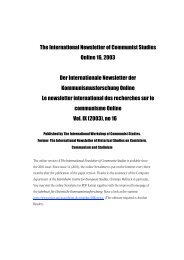Vol. XIII (2007), no 20 - The International Newsletter of Communist ...
Vol. XIII (2007), no 20 - The International Newsletter of Communist ...
Vol. XIII (2007), no 20 - The International Newsletter of Communist ...
Erfolgreiche ePaper selbst erstellen
Machen Sie aus Ihren PDF Publikationen ein blätterbares Flipbook mit unserer einzigartigen Google optimierten e-Paper Software.
<strong>The</strong> <strong>International</strong> Newletter <strong>of</strong> <strong>Communist</strong> Studies Online <strong>XIII</strong> (<strong><strong>20</strong>07</strong>), <strong>no</strong> <strong>20</strong> 37<br />
Fredrik Petersson, Åbo:<br />
“We are <strong>no</strong> Visionaries and Utopian Dreamers” – <strong>The</strong> Network <strong>of</strong> the Axis<br />
League against Imperialism, Comintern, and the Anti-imperialist Struggle,<br />
1924-1933. Doctoral thesis project.<br />
<strong>The</strong> League against Imperialism and for National Independence (LAI) was founded as a result<br />
<strong>of</strong> the “First <strong>International</strong> Congress in Support <strong>of</strong> the Oppressed Peoples in the Colonies” in<br />
Brussels 10-15/2-1927. No such event had taken place before where the situation in the<br />
colonial world was put on top <strong>of</strong> the agenda. With delegations representing European working<br />
class organizations, radical and pacifist intellectuals active either as artists or scientists, and<br />
representatives from the colonial world, the congress even surprised the chief architects,<br />
namely the <strong>Communist</strong> <strong>International</strong> (more k<strong>no</strong>wn as Comintern, or the Third <strong>International</strong>,<br />
1919-1943) 73 and the German communist and main man in charge <strong>of</strong> various propaganda<br />
operations and relief actions in Europe during the Inter-war era, Willi Münzenberg (1889-<br />
1940). 74 <strong>The</strong> twist with organising the congress was to keep the communist links <strong>of</strong> the LAI<br />
hidden and secret, all guided after principles decided upon a year earlier in Moscow. 75 Hence,<br />
the LAI was from the very beginning constructed as a genuine front and idealist <strong>no</strong>n-party<br />
organization, existing under communist surveillance and monitored by Comintern<br />
headquarters in Moscow. In its initial phase, the LAI stirred up a huge amount <strong>of</strong> attention<br />
among its sympathizers, but also fear among actors (mainly the “Imperialist” nations), who<br />
did <strong>no</strong>t <strong>no</strong>w how to approach and treat such a dubious and subversive organization as the LAI.<br />
<strong>The</strong> general concern during LAI’s first phase was primarily to act as a nursery for colonial<br />
freedom fighters. For example, India’s first Prime Minister Jawaharlal Nehru and Mohammad<br />
Hatta, one <strong>of</strong> the driving forces behind the formation <strong>of</strong> Indonesia in the 1940s were<br />
particularly active in the organization. Other fellow travelling celebrities as scientist Albert<br />
Einstein, French authors Henri Barbusse and Romain Rolland were members.<br />
73 <strong>The</strong> <strong>Communist</strong> <strong>International</strong> was founded on initiative by Lenin, and the first congress was held in<br />
Moscow 2-6/4-1919. <strong>The</strong> Comintern was dissolved in 1943.<br />
74 <strong>The</strong> most valuable interpretation on Willi Münzenberg’s life and career as a communist and in the<br />
Comintern is still the work compiled by his wife Babette Gross, Willi Münzenberg. Eine politische<br />
Biographie. Mit einem Vorwort von Arthur Koestler (Stuttgart, 1967). Other examples are Sean<br />
McMeekin’s <strong>The</strong> Red Millionaire (Yale University Press, <strong>20</strong>03) and Stephen Koch in Double Lives (London,<br />
1995), but in one way or the other these two have failed to put forward a coherent picture. Instead, see<br />
Michael Scammell’s article “<strong>The</strong> Mystery <strong>of</strong> Willi Münzenberg” in New York Review <strong>of</strong> Books, 3/11-<strong>20</strong>05,<br />
and Thomas Kampen’s “Solidarität und Propaganda: Willi Münzenberg, die <strong>International</strong>e Arbeiterhilfe<br />
und China” in Zeitschrift für Weltgeschichte, Jahrgang 5, Heft 2 (Herbst <strong>20</strong>04), pp.99-106 for a justified<br />
and complex analysis on the nature <strong>of</strong> Münzenberg. <strong>The</strong> Brussels Congress was visited by 174 delegates,<br />
representing 104 organizations, both colonial and European.<br />
75 Rossiisky Gosudarstvenny Arkhiv Sotsial<strong>no</strong>i i Politicheskoi Istorii (RGASPI) Fond 542/1/3, pp.15-17,<br />
Instructions from ECCI Secretariat in Moscow to Münzenberg in Berlin, 2/7-1926. <strong>The</strong> quote from these<br />
instructions illustrates this further: “While influencing and directing the entire work <strong>of</strong> the League, the<br />
<strong>Communist</strong> Fraction should try to remain as much as possible in the background, so that neither the<br />
League <strong>no</strong>r the Congress is too obviously identified with the <strong>Communist</strong>s.”














